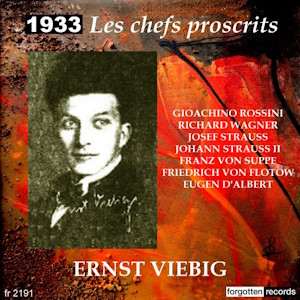
Ernst Viebig (conductor)
1933: Les chefs proscrits
Members of the orchestra of the Staatsoper, Berlin
Berlin Philharmonic Orchestra
Orchestra of the Staatskapelle Berlin
rec. 1926-30, Berlin
Forgotten Records FR2191 [76]
Historian and collector Eric Faleur has made available to Forgotten Records his collection of 78s reflecting the Weimar recordings of conductors soon to become exiles from Germany after the rise of the Nazis. Names such as Oskar Fried and Kurt Sanderling are well-known, let alone figures like Bruno Walter and Otto Klemperer, among many others, but what of the smaller names who were consistent players in the German record industry of the time but whose names have not survived the scrutiny of history. What of Wilhelm Gosz, for example – the subject of another such release – or Ernst Viebig, the subject of this one?
Viebig (1897-1959) was born in Berlin and his father, born Fritz Theodore Cohn, converted to Lutheran Protestantism on his marriage to his mother, Clara Viebig. The household was artistic and creative and Viebig studied piano, later composing a small series of operas from the early 1920s onwards. In 1925 he became musical director of the Electrola record company which put him in an advantageous position to make recordings. By 1933, the threats to him as a Communist and as a ‘half-Jew’ were too severe and he left for South America where he tried and failed to resume successful composition. Instead, he ran a specialist bookshop. Both his marriages having ended in divorce, he returned to Germany in 1958 but died the following year.
This release focuses on a small series of ten-inch discs made in Berlin between 1926 and 1930, the majority with the Orchestra of the Staatskapelle Berlin but some with the Berlin Philharmonic. It’s hard to categorise Viebig from this light-hearted potpourri of discs, as there is nothing heavier against which to judge him. Even the Mastersingers extract is a fantasie on its themes. His excursion into the world of Josef Strauss tends to emphasise the frisky and frivolous as Dorfschwalben aus Österrich (Village Swallows from Austria) is swamped by a tinkling piano alongside a plethora of bird chirrups and an air of benign kitsch oversees the significantly truncated three minutes. Given that these Electrolas, Telefunkens and Ultraphons were ten-inch discs some truncation has been necessary – as is also the case with the first item, The Thieving Magpie overture, though even so Viebig brings some buoyancy to proceedings and good underlying rhythm.
The piano’s concertante use in Johann Strauss’ Rosen aus dem Süden (Roses from the South) does, however, reinforce the benevolently half-way house nature of some of these recordings – neither strictly authentic waltzes (the Kaiser Waltz is another example of abridgement) but not wholly facetious in execution. One of the curiously successful recordings is the overture to Eine Nacht in Venedig (A Night in Venice) where the Staatsoper’s strings are on fine form. The overture to d’Albert’s Tiefland is heard in the arrangement by Gustav Paepke, and this receives a reading of sweeping romantic fervour limited only by the sonics.
My review copy’s CD has Wilhelm Grosz’s name on it, though this is clearly a harmless mistake as the recording are certainly by Viebig.
Though their discs are usually without notes, this particular series has a well-researched booklet in French and English. The transfers have been well done, too, and I’d have welcomed only a touch more openness.
Jonathan Woolf


















